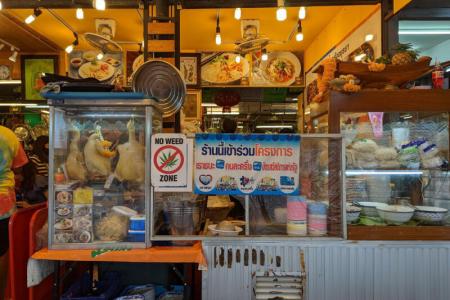'It looked like kangkung,' says S'porean tourist who accidentally ate cannabis dish in Thailand
BANGKOK - While holidaying in July in Chiang Rai, Thailand, a Singaporean and her family ordered a "very nice bowl" of noodle soup during dinner at the hotel restaurant.
The housewife, who was travelling with her husband, elderly mother-in-law and two young children, enjoyed the dish so much that she ordered it again for breakfast.
"I took a closer look at the menu then and saw a small cannabis leaf image next to the picture of the dish," said the woman who wanted to be known only as Sueanne.
"We were quite shocked. We have seen cannabis in sweets and drinks at specialised shops, but we never thought it would appear in such an ordinary dish," she said.
Sueanne said there was no other indication in the dish's name or description that it contained cannabis and the wait staff did not say anything.
"If I had noticed the logo, or if the waiter had told me, I would not have ordered it," said Sueanne, adding that it was fortunate that her children did not try the dish.
Cannabis products and dishes have become increasingly common in Thailand in recent years.
While it is required for retailers and vendors to explicitly label or tell buyers that there is cannabis in their products, some travellers like Sueanne are still worried.
"It was boiled in the soup like a normal vegetable and looked just like kangkung," said Sueanne, adding that she did not feel any side effects or mood changes after her meal.
Since Thailand became the first South-east Asian country to legalise medical cannabis in 2018, the authorities have gradually eased restrictions on the substance.
In February 2021, Thailand allowed cannabis to be used in food and drink if the amount of tetrahydrocannabinol (THC) - the chemical associated with the "high" in cannabis - is less than 0.2 per cent of the product's weight.
In June 2022, Thailand decriminalised cannabis and hemp plants, allowing people to grow and possess them. The authorities say this will boost medical use and create economic benefits as people can grow the plants for commercial purposes.
The cannabis plant, however, now exists in a legal gap after it was taken off the narcotics list as Thailand's cannabis Bill, meant to regulate misuse, has been delayed.
There are interim laws to prevent cannabis and related products from being sold to those below the age of 20 and women who are pregnant or breastfeeding.
Public nuisance laws can also be used if someone smokes cannabis in public and disturbs others.
The last three months have seen a rapid rise of cannabis-infused products appearing in restaurants, supermarkets and convenience stores. They include cannabis-infused hotpot, cannabis seasoning packets and even cannabis skincare.
As borders reopen and travel to Thailand resumes, some tourists have found the presence of cannabis - still considered a drug in Singapore and many other countries - somewhat disconcerting.
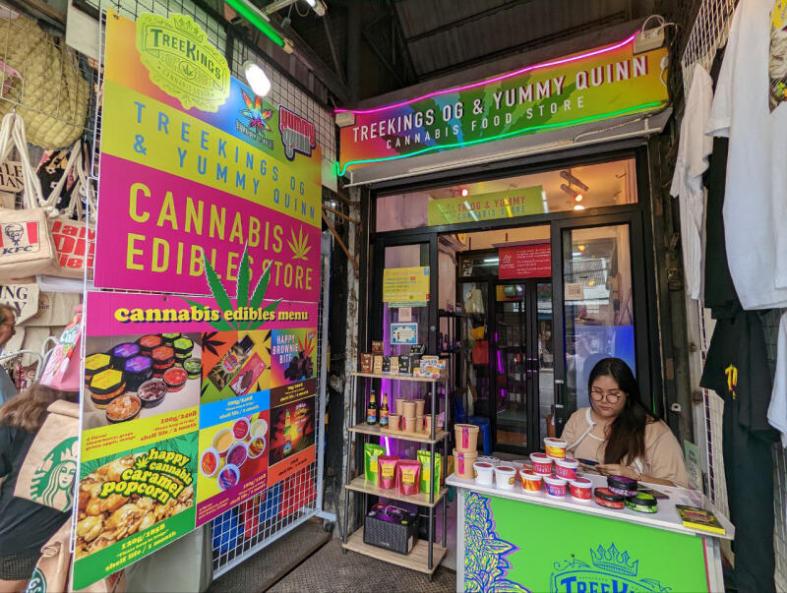
On a recent holiday to Phuket, Singaporean Lim Ai Shi, 30, who works in banking, passed by some cannabis shops but did not visit them.
"Maybe I was being paranoid, but I was concerned that traces of cannabis could stick to my clothes or bag and might cause me trouble at Customs, even if I did not consume any drugs," she said.
Singapore's drug laws state that citizens and permanent residents found to have consumed controlled drugs such as cannabis overseas can be found guilty of drug consumption upon their return.
However, if one unknowingly consumes drugs, this is usually not an offence, said Home Affairs and Law Minister K. Shanmugam in September. He was replying to MPs' concerns over the accidental purchase or consumption of cannabis overseas.
The Central Narcotics Bureau (CNB) said it does not have statistics for the number of people who unknowingly consume cannabis.
Regarding the use of topical creams or skincare containing hemp or cannabis, CNB said that regardless of the method it was "ingested", anyone whose urine tests positive for cannabis or other drugs will be investigated.
The Tourism Authority of Thailand (TAT) advises tourists to study and comply with the cannabis and hemp regulations of their next destination.
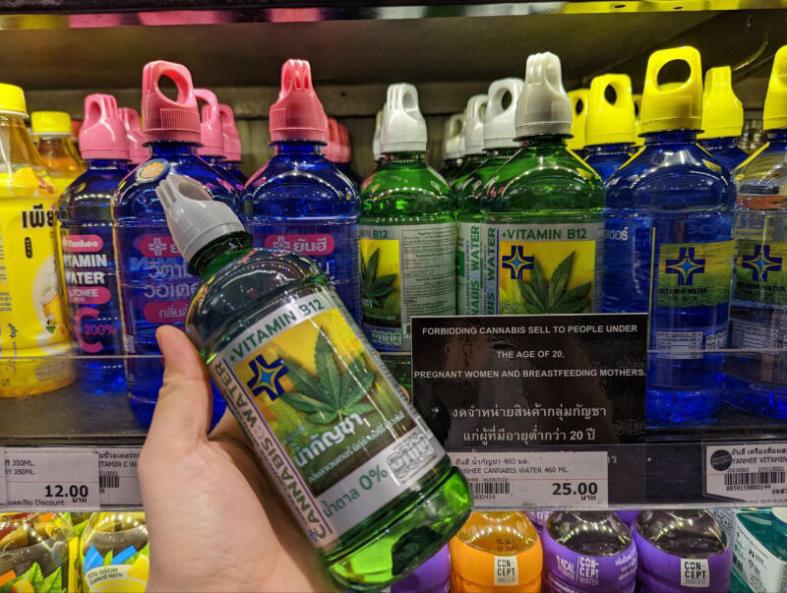
According to Thai law, food and drink with cannabis cannot contain more than 0.2 per cent of THC by weight of the product. These items must also be clearly labelled to say that they contain cannabis.
"This will help tourists avoid consuming (cannabis) and avoid violating the regulations in their home country or at their next destination," said the TAT.
Some vendors in tourist hot spots such as Chatuchak Market have also put up signs saying that cannabis is not allowed at their eateries in the hope of assuaging worries.
Retailers selling cannabis-infused food and drink need to register with the authorities, said Mr Kreephet Hanpongpipat, 33, who runs Kanom Siam, a popular Thai dessert chain that sells a cannabis-pandan flavoured cake.
"I sell them at only one outlet because the process to register each outlet with the government is too complicated," said Mr Kreephet, who uses signs and marijuana leaf images at the shop to indicate that some products contain cannabis.
"People ask me if they will get high from eating this. The answer is no," he said.
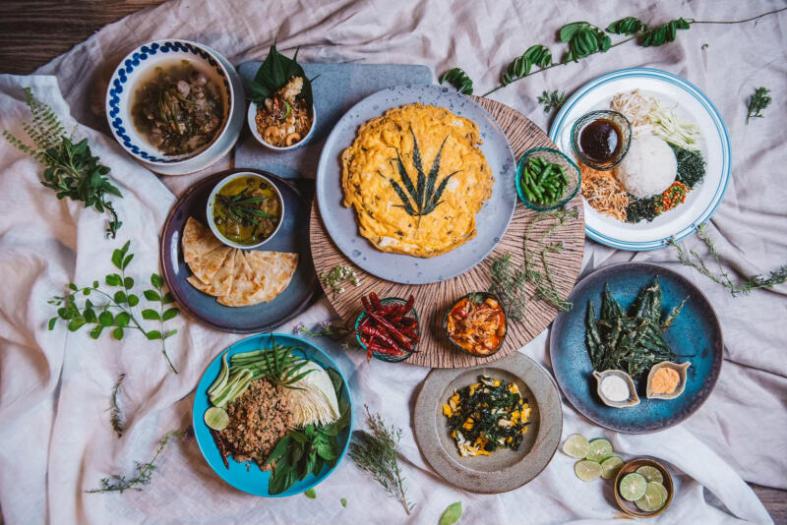
Cannabis is also a selling point for eateries like Kiew Kai Ka, which has outlets in Bangkok and Chiang Mai. It serves Thai food and offers cannabis dishes in a section of its menu that is labelled as such.
Manager Nuttapong Lenglerdphol said that locals and tourists come to try the cannabis dishes.
"We had a group of Singaporeans this month," he said.
His employees are told to warn diners against eating too many cannabis dishes and also to caution groups with children and pregnant women on items that contain cannabis.
"I believe most people come here for the food experience and not with the intention to get high," said Mr Nuttapong, adding that he has never seen anyone get intoxicated after eating the cannabis dishes.
Shops specialising in cannabis buds, edibles and smoking paraphernalia have also mushroomed across Thailand, and their large marijuana leaf symbols and brightly coloured shopfronts are hard to miss.
Several cannabis shops told The Straits Times that their customers are mostly foreigners, including tourists from Singapore.
"Many Singaporeans come here. They will ask about the buds, and then ask how long cannabis will stay in the body," said Greenhead Clinic co-owner Tanet Arayasakdakun.
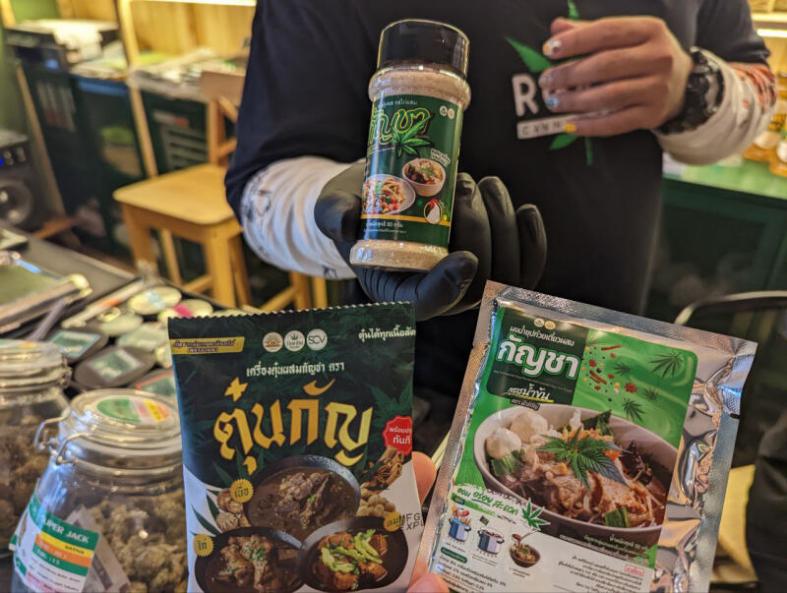
Mr Ong-ard Panyachatiraksa, who co-owns RG420 in Khaosan Road, said customers usually have some experience using cannabis.
Thailand's draft cannabis law was withdrawn before its second reading in September when some lawmakers voiced opposition, saying that it lacked sufficient provisions to prevent misuse.
This means that the law, which is meant to regulate the wider use of cannabis and clamp down on recreational cannabis, could be delayed until 2023.
Mr Ong-ard and his partners are planning to open four more cannabis shops, but the possible new laws could force them to remove some recreational products.
"We will have to adapt to changes. But we would like people to know that cannabis can be a good thing if the bad aspects are controlled," he said.
Get The New Paper on your phone with the free TNP app. Download from the Apple App Store or Google Play Store now

